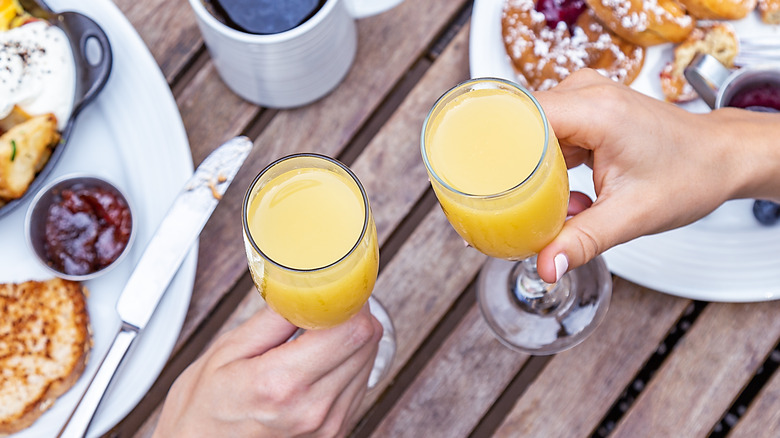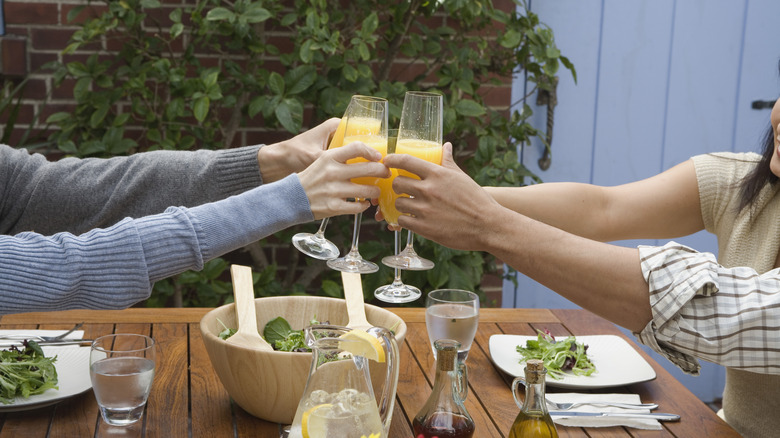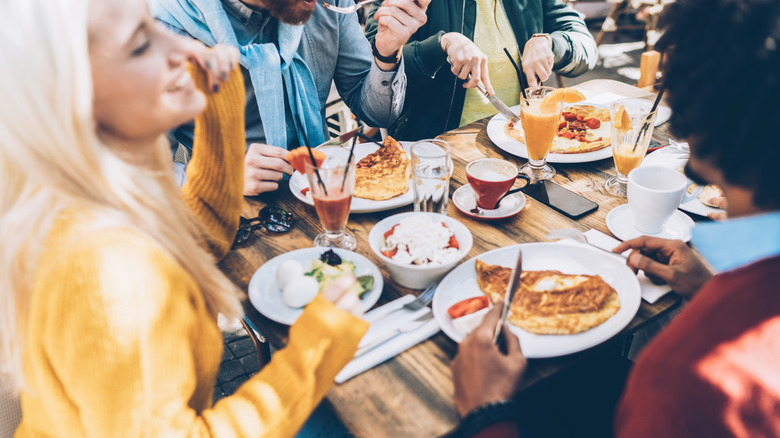When Is Brunch, Technically?
What happens when you combine sweet breakfast food, savory lunch dishes, and an endless supply of bubbly? Brunch, of course — everyone's favorite excuse to indulge in large portions of rich foods and boozy mimosas that only contain a few drops of orange juice. Brunch can be extravagant, complete with bumps of caviar and champagne towers, or a simple gathering of friends for a midmorning meal. But penciling in this special time on your calendar is a bit more complicated than you might think.
Most people can confidently assume that lunch plans will happen around noon and a dinner date is clearly an evening activity. However, everyone has a slightly different understanding of when exactly brunch occurs. Even restaurants have vastly different definitions of this elusive meal time, with some ending their bottomless mimosa brunches at 1 p.m., while others extend their offerings until nearly 4 p.m.
The question, "When is the best time to have brunch?" might seem like it has a straightforward answer, but the debate is far from settled. While it is for sure a midmorning/early afternoon excursion that is commonly associated with Sundays, there are plenty of exceptions that make it a rather complicated topic.
Brunch is more of a vibe than a specific time
Brunch is more than just a meal, it's a whole event. Technically speaking, a majority of people understand that it happens on Sunday mornings from 11 a.m. until around 2 p.m. But some will argue that other days and times can also be classified as brunch-worthy. Rather than argue about exact specifications, it is best to acknowledge that it's mostly a feeling, when you are relaxed and surrounded by good food and even better company. But we can all agree that there are a few rules a meal must follow for it to be classified as brunch.
Decidedly, this type of meal only happens on weekends. As much as people would love a hump day brunch special to get workers through the rest of the week, it's reserved for days when you are totally off the clock. This allows brunch-goers to let their hair down early and really take advantage of the bottomless mimosa deal without the worry of tomorrow's hangover.
This type of dining experience can also consist of practically any cuisine, as long as the dishes offered are usually enjoyed during either breakfast or lunchtime. Most people wouldn't classify a meal as brunch unless mimosas or other boozy beverages are offered, although those who are sober may choose not to partake. It's the option to indulge that classifies it as brunch more so than actually partaking in day drinking.
The term brunch has been around for over a century
The usage of the word "brunch" was first coined by Guy Beringer in an 1895 article for Hunter's Weekly, where he posited there should be a lighter meal that could be enjoyed later after church. However, the trend didn't become mainstream until almost 70 years later, when people regardless of their economic status were indulging in food later in the day on weekends.
The Washington Post discussed the demographics of brunch stating that "brunch continues to grow anywhere there is disposable income or time." Data gathered by Google searches also showed that more people on the East and West Coast are more likely to enjoy brunch than those in middle America. This trend could be due to population, median income, and even social responsibilities such as children and religious practices on weekends.
As people scale back on traditional breakfasts and opt for a piece of fruit or a protein shake before heading out the door to start their busy day, brunch continues to gain popularity. It's ultimately an event where people allow themselves to take time and enjoy the dishes they may not have time to whip up during the week.


